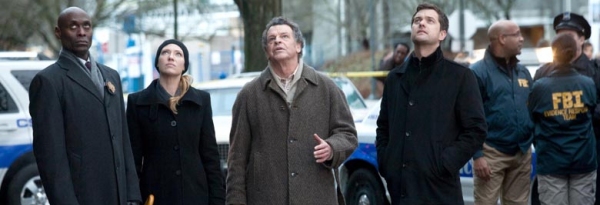This seems like an odd time for ‘Fringe’ to have a case-of-the-week episode. Aren’t we coming right up on the season (and possibly series) finale just two more episodes away? Shouldn’t the show be diving whole-hog into resolving its season story arc now? Don’t get me wrong, last Friday’s was a pretty good episode overall, and it does have some tie-in with the running storylines, but it really feels like it’s throwing the show’s momentum off.
In ‘Os’, a pair of thieves robbing a precious metals depository have somehow managed to defeat gravity. They float weightlessly in the air like astronauts in orbit. When a security guard shoots one of them, even his blood spatter drifts upwards, and his body (tethered to a rope) bobs around like a balloon. Walter is baffled.
The thieves were trying to steal osmium, one of the heaviest metals. This makes their weightlessness all the more confounding. The surviving thief escapes back to his boss, an aeronautical engineer named Dr. Crick (played by Alan Ruck from ‘Ferris Bueller‘ and ‘Persons Unknown‘), but the thief doesn’t live long. He soon starts bleeding from his eyes, and then dies for seemingly no reason.
Peter and Olivia are now (finally) a happy couple. In order to avoid the problems they had in the past, they now have a “full disclosure” policy in their relationship. On the trail of the other thief, they make their way to Crick’s secret warehouse laboratory. The doctor has escaped, but they find a makeshift morgue filled with previous test subjects.
Walter notices that all of the bodies have atrophied leg muscles, but fully developed upper bodies. When a stack of discarded wheelchairs is found behind the warehouse, he makes the connection that the perpetrator has been experimenting on people with muscular dystrophy. Sure enough, it turns out that Crick’s own son has MD. Crick is the latest in the long line of misguided scientists in the show’s history. He just wants to find a cure for his son, even if it means having to sacrifice others.
Crick is running low not just on osmium, but also another rare element found in meteorites. He recruits a teenage boy his son’s age to be his next subject and his helper. Together, they stage a heist on the Museum of Science. (The rinky-dink building seen here bears no resemblance to the real Boston MoS.) However, by this point, Walter, Peter, and Olivia have figured out what’s going on and race to the museum to foil the robbery. In the midst of this, the teenage kid comes loose from his rope harness and nearly floats uncontrollably off into space (this ridiculous museum has a huge open skylight in the ceiling), until Peter races up some stairs and leaps on top of him just in the nick of time.
Wrapping all of this up, Walter demands that Crick explain how he developed the anti-gravity formula. Crick is almost as perplexed by it as Walter. He says that he discovered it when he accidentally combined osmium with the other element (which is also a heavy metal). There’s no logical reason why the combination of these two things should result in weightlessness, but it works all the same. Walter then theorizes that this has to do with the breach between the two universes. The fabric of our universe is breaking down and causing disruptions in the laws of physics. This makes the destruction of the alternate universe all the more critical to save our own.
While all of this is going on, Peter has been secretly experimenting on the memory discs he pulled from all the shapeshifters he murdered, because he believes they’ll help him complete the doomsday weapon. As part of his full disclosure agreement with Olivia, he tells her what he’s been doing. Before she can really even process this, their conversation is disrupted by what Walter’s been doing in his other storyline.
Now more than ever, Walter has been feeling the loss of his friend William Bell. He worries that he’s not up to the job of solving this case, much less protecting our universe in the upcoming war. As such, he starts digging through the documents in Bell’s office until he discovers that Bell had been experimenting with something called “soul magnets” that could attract a person’s spirit after death and transplant it into a new host body. He figures out that the brass bell that Nina Sharp received from the estate must be the triggering device. Ringing the bell will create a harmonic synchronicity that will pull the soul into the host body. Or somesuch nonsense. Walter rings the bell, expecting Nina’s body to be taken over by his friend. That doesn’t happen, because Nina wasn’t the host. On the other side of town, Olivia suddenly starts talking in a husky Leonard Nimoy impersonation. From the previews, it looks like she’s going to be doing this all next episode.
You know, I kind of like the main storyline in this episode, even if it ends with a deus ex machine explanation. However, the afterlife gobbledygook is pretty ridiculous, even for ‘Fringe’.
I also failed to mention earlier that the episode opens with a cameo by Jorge Garcia from ‘Lost’, who plays a security guard at Massive Dynamic. He and Walter get high together. Other than the fan service, the scene serves no purpose to the episode as a whole. Garcia also looks like he’s put on another hundred pounds or so since ‘Lost’ went off the air.





JoeRo
I’m usually a big defender of Fringe, but as you point out the last minute re-introduction of Bell’s character via Oliva is just a bit over the line for me. It seems ridiculous to draw the line there in a series so full of wtf-ery, but there you have it. Prior to this absurd twist the episode is quite alright, it’s not a high point in the series but neither is it a low point.
It’s worth noting that the show has largely deviated from telling it’s overarching story in favor of monster-of-the-week episodes, which doesn’t make sense at this point. The writers should feel free to explore these uinverse and its characters as they see fit, impending cancellation or no. On the other hand, lets get a move on shall we.
—Not directly related to this post, but I’ve noticed an increasing number of html errors on this site within google chrome. I was actually unable to enter this comment in chrome, and had to resort to the much prettier ie9 to write this comment. Anyone else experiencing an problems in chrome?–
Josh Zyber
AuthorWhat gets me is that it was just two episodes earlier that Walter adamantly scoffed at the notion of ghosts, and now he’s all about them with no explanation. Maybe this is deliberate and meant to represent Walter opening his mind to non-scientific possibilities, but the way it was presented (as if the soul was a real quantifiable scientific concept) feels like a major inconsistency.
I just opened this post in Chrome and don’t see any HTML errors. I was able to post this comment from it as well. What are you seeing?
Bryan
Playing devil’s advocate for a minute – Walter’s views on ghosts and then on the “soul magnet” are not entirely contradictory. He doesn’t believe that a spirit can exist in a non-corporeal form floating around on it’s own (or that we could have any interaction with it). However, a spirit can exist if it has a host body to “speak” through.
Having said that – yes, it was a strange time to do this kind of episode. Although it does show the more general, unintended consequences of Walter’s actions and the “fabric of reality” breaking down between the two universes.